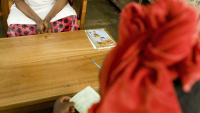Action

We believe that contraceptive and abortion-related services will be integrated more into humanitarian health response when evidence from humanitarian settings demonstrates that these services can be provided and make a difference in people’s lives, and this evidence is shared with the broader field (please see Resources for publications of results of our work).
RAISE worked with partners, CARE, International Rescue Committee (IRC) and Save the Children, to measure population-level contraceptive prevalence in program areas in North and South Kivu, Democratic Republic of the Congo (DRC). The studies found that modern contraceptive prevalence among women in union ranged from 8.4% to 26.7% in the six health zones; current use of long-acting or permanent methods ranged from 2.5% to 19.8%. These figures are higher than those for North and South Kivu in the 2014 DRC Demographic and Health Survey. Sexually active adolescent and young women aged 15–24 in this population also used modern contraception (16.5%) although unmet need was also high. Among current users, more than half of 15–19-year-olds were using a long-acting reversible contraceptive compared to 36.5% of 20–24-year-olds.
In addition, we explored barriers and facilitators of abortion-related services in these areas as perceived by the community and by providers. Results from focus-group discussions indicated that while abortion stigma was widespread, community members’ attitudes towards women who induced abortions were not one-dimensional. Participants initially expressed negative opinions regarding women who induced abortion, but their beliefs became more nuanced as discussion shifted to the specific situations that could motivate a woman to do so.
DRC presents challenges common to many humanitarian settings with periods of acute conflict and stability, internally displaced populations who settled in either camps or among host communities, and weak government services. Results from DRC are relevant to many other humanitarian settings in low income countries.
Post-abortion care (PAC) is a critical life-saving intervention that is often severely lacking in humanitarian settings. RAISE worked with International Medical Corps to identify factors that influence access to and use of PAC services. Humanitarian health actors should support health workers to provide PAC, including post-abortion contraception. Despite widespread abortion stigma, community attitudes are complex and our study showed a clear opening to address community attitudes and stigma that prevent women from seeking PAC.
RAISE works with the IRC and the University of N’Djamena Chad to explore the barriers and socio-cultural determinants of women’s access to and use of SRH services in two provinces. These influences on women’s decision-making will allow for the better understanding of the decisions that lead to the utilization of these services, and the barriers that prevent women/adolescents from accessing them. These data will be used by IRC to address these barriers and ultimately ensure that more women have access to critical SRH services.
RAISE continues to serve on the Steering Committee of the Inter-Agency Working Group on Reproductive Health in Crises (IAWG), a coalition of UN, government, non-government, research and donor organizations that work to expand and strengthen access to good quality sexual and reproductive health services for people affected by conflict and natural disaster. Currently, in addition to being a member of the IAWG Steering Committee, RAISE staff are members of the Safe Abortion Care, Voluntary Contraception, Adolescent SRH and M&E sub-working groups.